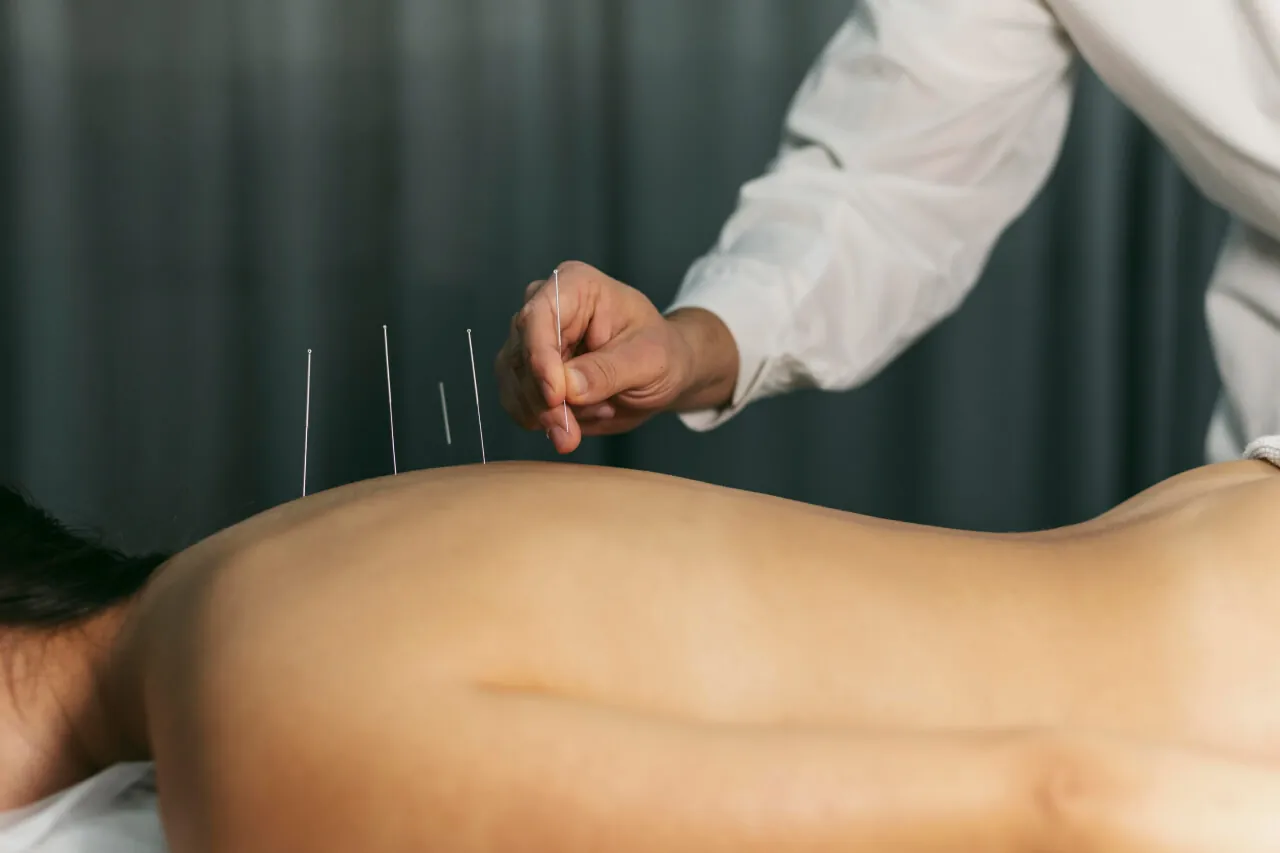For centuries, acupuncture has been a cornerstone of Traditional Chinese Medicine, believed to balance the body’s energy flow (qi) through the insertion of thin needles at specific points along meridians.
But beyond its ancient roots, It is gaining modern traction as a complementary therapy for a wide range of health concerns, including weight loss, anxiety, and pain management.
Acupuncture, deeply rooted in traditional Chinese medicine, involves the meticulous stimulation of specific points on the body using fine needles.
While extensively studied for pain management, particularly in addressing issues like headaches and various types of pain, there is a discernible gap in comprehensive research exploring its potential effectiveness for weight loss.
Despite this, some individuals have reported finding It beneficial, and it is generally considered safe for most individuals to explore.
Acupuncture for Weight Loss
Proponents for weight loss posit that it can influence the body’s energy flow, or chi, thereby impacting factors associated with obesity reversal.
This includes claims of increased metabolism, reduced appetite, lower stress levels, and an influence on the brain’s hunger-related functions.
Traditional Chinese medicine attributes weight gain to an imbalance in the body, often tied to the malfunctioning of organs such as the liver, spleen, kidney, thyroid gland, and endocrine system.
It’s treatments, in this context, commonly target these specific areas.
Ear Acupuncture for Weight Loss
Ear acupuncture, also known as auricular acupuncture, is a specialized approach within the realm of traditional Chinese medicine that has gained attention for its potential role in weight loss.
This technique involves the stimulation of specific points on the ear to influence various aspects of the body, including appetite, cravings, and metabolism.
Here’s a more in-depth exploration of ear acupuncture for weight loss:
Principles of Ear Acupuncture:
Auricular Points
Ear acupuncture operates on the principle that the ear is a microsystem reflecting the entire body.
Different points on the ear correspond to specific organs, functions, or body parts.
Control of Appetite and Cravings
Advocates of ear acupuncture believe that stimulating certain points on the ear can impact the control centers in the brain associated with appetite and cravings.
Nervous System Regulation
The stimulation of specific ear points is thought to influence the autonomic nervous system, which plays a role in regulating bodily functions, including metabolism.
Endorphin Release
It’s, in general, is associated with the release of endorphins, the body’s natural painkillers.
This can potentially influence mood and stress levels, factors that contribute to overeating.
Application of Ear Acupuncture for Weight Loss
Needle Insertion
Fine, sterile needles are delicately inserted into specific points on the outer ear.
The selection of points may vary based on individual assessments by the practitioner.
Seed or Magnet Application
In some instances, practitioners may use small seeds or magnets taped to specific ear points.
This provides ongoing stimulation between acupuncture sessions.
Acupressure
Acupressure techniques, involving the application of pressure on specific ear points, might be employed for those averse to needle insertion.
Theoretical Mechanisms
Appetite Regulation
Advocates suggest that ear acupuncture may help regulate appetite by influencing the hypothalamus, the part of the brain responsible for controlling hunger and satiety.
Stress Reduction
By targeting points associated with stress response, ear acupuncture may contribute to stress reduction.
Elevated stress levels are often linked to emotional eating and weight gain.
Metabolic Impact
Some proponents believe that ear acupuncture can have a positive effect on metabolism, potentially assisting the body in burning calories more efficiently.
Treatment Duration and Frequency
Varied Recommendations
The number of sessions recommended can vary widely.
Practitioners may suggest multiple sessions per week initially, tapering off as progress is made.
Individualized Plans
Treatment plans are often tailored to the individual’s specific needs, weight loss goals, and response to the therapy.
Considerations and Precautions
Professional Guidance:
It is crucial to seek ear acupuncture from a qualified and licensed practitioner with experience in this specific technique.
Comprehensive Approach:
Ear acupuncture is often recommended as part of a comprehensive weight loss plan that includes dietary changes, exercise, and lifestyle modifications.
Individual Responses:
Responses to ear acupuncture can vary among individuals, and its effectiveness may be influenced by factors such as overall health, adherence to the treatment plan, and the presence of underlying medical conditions.
Treatment Duration
The recommended number of acupuncture sessions can vary among practitioners.
For those aiming to lose a moderate amount of weight (10 to 15 pounds), a common program involves several treatments per week over a span of six to eight weeks.
As the program progresses, the frequency of visits may be adjusted accordingly.
Positive Attitude and Weight Loss
Maintaining a positive attitude plays a pivotal role in the journey of weight loss, extending beyond mere mental outlook to impact lifestyle choices, behaviors, and overall well-being.
Here’s a detailed exploration of how a positive attitude can significantly influence the process of shedding excess weight:
Mind-Body Connection: Positive Reinforcement
A positive mindset reinforces the connection between mental and physical well-being.
Believing in the ability to achieve weight loss goals can lead to increased motivation and adherence to healthier habits.
Motivation and Consistency: Intrinsic Motivation
Positive attitudes foster intrinsic motivation.
When individuals genuinely believe in their capacity to make positive changes, they are more likely to remain consistent in their efforts, even when faced with challenges.
Improved Emotional Well-being: Stress Reduction
Maintaining a positive attitude contributes to stress reduction.
Lower stress levels are linked to healthier eating patterns, as stress often triggers emotional eating or cravings for unhealthy foods.
Lifestyle Choices: Healthier Choices
A positive attitude is associated with making healthier lifestyle choices.
Individuals with a positive mindset are more inclined to choose nutritious foods, engage in regular physical activity, and adopt habits that contribute to overall well-being.
Resilience and Adaptability: Resilience
Positivity enhances resilience in the face of setbacks.
Weight loss journeys inevitably encounter challenges, and a positive attitude helps individuals bounce back, learn from setbacks, and stay focused on their goals.
Impact on Self-Efficacy: Self-Belief
Positive attitudes boost self-efficacy—the belief in one’s ability to accomplish tasks and achieve goals.
High self-efficacy is associated with successful weight management as individuals approach challenges with confidence.
Social Support and Accountability: Attracting Support
Positive individuals often attract social support.
Friends and family are more likely to support and encourage those with a positive attitude in their weight loss endeavors, creating a conducive environment for success.
Emotional Eating and Coping Mechanisms: Healthy Coping Strategies
Positive attitudes contribute to the development of healthier coping mechanisms.
Instead of turning to food for emotional comfort, individuals with a positive mindset are more likely to seek constructive outlets for stress and emotions.
Long-Term Lifestyle Changes: Sustainability:
Positive attitudes are linked to a mindset focused on long-term lifestyle changes rather than short-term fixes.
This approach is crucial for sustained weight loss and overall health improvement.
Self-Love and Body Positivity: Acceptance
A positive attitude includes self-love and body positivity.
Accepting and appreciating one’s body at every stage of the weight loss journey fosters a healthier relationship with food and exercise.
Cognitive Restructuring: Positive Framing:
Positive thinkers tend to engage in cognitive restructuring, reframing challenges into opportunities for growth.
This mental shift is invaluable in overcoming obstacles and maintaining progress.
Challenges in Acupuncture Research:
The scarcity of studies on acupuncture for weight loss is attributed to various methodological challenges.
Combining results from small studies proves difficult due to variations in techniques, acupuncture points, session frequency and duration, use of placebos or sham interventions, and the profound impact of participants’ beliefs and expectations on study outcomes.
Acupuncture for Anxiety
The calming nature of acupuncture can be highly beneficial for managing anxiety symptoms.
Here’s how it can help:
Neurotransmitter modulation:
Research suggests acupuncture may influence the release of mood-regulating neurotransmitters like serotonin and dopamine, improving emotional balance and reducing anxiety.
Stress reduction:
As mentioned earlier, acupuncture’s stress-relieving properties can significantly impact anxiety, promoting relaxation and inner peace.
Improved sleep:
Anxiety often disrupts sleep, creating a vicious cycle.
Acupuncture’s ability to promote deeper sleep can break this cycle, reducing anxiety and improving overall well-being.
Acupuncture for More
Acupuncture’s therapeutic scope extends far beyond weight loss and anxiety.
It can be used to address a variety of concerns, including:
- Pain management: Acupuncture is widely recognized for its ability to alleviate pain from headaches, migraines, back pain, and arthritis.
- Insomnia: Acupuncture’s calming effect can promote deeper, more restful sleep for those struggling with insomnia.
- Nausea and vomiting: Acupuncture has been shown to be effective in reducing nausea and vomiting, particularly in pregnant women and cancer patients undergoing chemotherapy.
- Addiction recovery: Studies suggest acupuncture can help manage cravings and withdrawal symptoms associated with addiction, supporting the recovery process.
What to Expect with Acupuncture:
Acupuncture may seem daunting at first, but the experience is generally painless. Here’s what you can expect:
- Consultation: Your acupuncturist will discuss your health concerns and goals, tailoring the treatment accordingly.
- Needle insertion: Thin, sterile needles are inserted at specific points on your body. The insertion is usually painless, and you may feel a slight tingling or warmth sensation.
- Relaxation: You’ll lie comfortably while the needles remain in place for 15-30 minutes. This is a time for complete relaxation and focus on your breathing.
Depending on your condition, you may need multiple sessions for optimal results.
Is Acupuncture Right for You?
Acupuncture is generally safe for most people, but it’s essential to consult your doctor before trying it, especially if you have any underlying health conditions or are pregnant.
Talk to your doctor about any medications you’re taking, as some may interact with acupuncture.
While acupuncture can be a powerful tool for improving health and well-being, it’s important to remember that it’s not a substitute for conventional medical care.
It’s best used as a complementary therapy alongside a healthy lifestyle and any doctor-recommended treatments.
Finding the Right Acupuncturist:
Choosing a qualified acupuncturist is essential for a safe and effective experience.
Look for acupuncturists licensed by your state and certified by a reputable national organization.
Ask friends for recommendations or research acupuncturists in your area online.
Safety Considerations
Practitioner Qualifications
Ensure that the acupuncture practitioner is qualified, licensed, and has undergone proper training.
A reputable practitioner follows established guidelines and maintains a clean and safe environment.
Clean Needle Techniques
Needles must be sterile and used only once to prevent infections.
A reputable acupuncturist adheres to strict clean needle techniques, minimizing the risk of bacterial or viral contamination.
Potential Side Effects
Mild side effects may include bruising or minimal bleeding at the needle insertion site.
While these are generally harmless, it’s essential to inform the practitioner if you experience prolonged bleeding or excessive bruising.
Individual Health Conditions
Individuals with certain health conditions, such as bleeding disorders or a compromised immune system, may be at a higher risk of complications.
It’s crucial to disclose all relevant health information to the acupuncturist before treatment.
Punctured Organs
Although rare, there is a slight risk of accidentally puncturing an organ during acupuncture.
This risk is minimized when performed by a skilled and experienced practitioner who carefully selects insertion points.
Collapsed Lungs
Collapsed lungs (pneumothorax) are an extremely rare but serious complication associated with acupuncture.
Proper needling techniques and knowledge of anatomy reduce the likelihood of this occurrence.
Central Nervous System Injury
Injury to the central nervous system is an extremely rare but severe complication.
Practitioners must have a thorough understanding of anatomy to avoid nerve damage during needle insertion.
Infections
Adherence to strict hygiene practices, including using sterile needles and maintaining a clean environment, is crucial for preventing infections.
If the practitioner does not follow proper protocols, there is a risk of bacterial or viral infections.
Consultation with a Healthcare Professional:
Before starting acupuncture for weight loss or any other health concern, it’s advisable to consult with a healthcare professional.
This is especially important for individuals with pre-existing medical conditions or those taking medications.
Allergic Reactions:
Individuals with known metal allergies should inform their acupuncturist.
While acupuncture needles are typically made of stainless steel, it’s essential to address any concerns related to metal sensitivity.
Personalized Treatment Plans:
Individualized Approach: Acupuncturists should develop personalized treatment plans based on individual health assessments.
One size does not fit all, and tailored approaches enhance safety and effectiveness.
Conclusion
While acupuncture may potentially assist in weight loss, the existing research is inconclusive.
Its effectiveness appears to be influenced by personal beliefs and attitudes.
Before considering acupuncture for weight loss, individuals are advised to discuss the pros and cons with a medical professional, integrate the treatment with healthier lifestyle choices, and seek the services of a trained and licensed acupuncturist for a comprehensive and safe approach.
FAQs
Can acupuncture really help with weight loss?
Yes, acupuncture is believed to aid weight loss by stimulating specific points that may influence metabolism, reduce appetite, and address imbalances related to organs such as the liver, spleen, and kidneys.
However, individual responses vary, and acupuncture should be part of a comprehensive weight loss plan.
Is acupuncture effective for anxiety?
Yes, acupuncture has shown promise in alleviating anxiety symptoms.
The practice is thought to regulate the nervous system, release endorphins, and promote a sense of relaxation.
It’s essential to consult with a qualified acupuncturist and consider acupuncture as part of a holistic approach to managing anxiety.
How many acupuncture sessions are needed for noticeable results?
The number of sessions varies based on individual factors and the specific condition being addressed.
While some people may experience benefits after a few sessions, a more extended treatment plan, typically spanning several weeks, may be recommended for lasting results.
Are there specific acupuncture points for weight loss and anxiety?
Yes, acupuncturists target specific points related to weight loss and anxiety.
For weight loss, points associated with metabolism, appetite regulation, and organ function are often focused on.
Anxiety may involve points related to stress reduction, nervous system balance, and emotional well-being.
Can acupuncture be combined with other weight loss or anxiety management strategies?
Absolutely.
Acupuncture can complement other strategies for weight loss, such as a healthy diet and exercise, or for anxiety, including therapy and lifestyle modifications.
A holistic approach that integrates multiple strategies often yields more comprehensive and sustained results.
Are there any potential side effects or risks associated with acupuncture?
Acupuncture is generally considered safe when performed by qualified practitioners.
Mild side effects may include bruising or minimal bleeding.
Rare complications, such as punctured organs or collapsed lungs, are extremely uncommon but highlight the importance of seeking acupuncture from experienced and licensed professionals.
Always disclose your health history to ensure a safe and tailored treatment.





